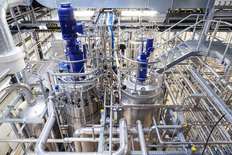- OPTISOCHEM started in June 2017 with €9.8 million funding from BBI-JU under H2020.
- The project involves Clariant, Global Bioenergies, INEOS, TechnipFMC, IPSB, and JKU Linz.
- The project aims to convert wheat straw into bio-isobutene, oligomers, and polymers.
- R&D cooperation will continue until May 2021.

Project Overview
OPTISOCHEM, initiated in June 2017, aims to demonstrate a new value chain by converting wheat straw into bio-isobutene. The project received €9.8 million in funding from the Bio Based Industry-Joint Undertaking (BBI-JU) under the HORIZON 2020 program.
Key Participants
The project involves several key players: Clariant, Global Bioenergies, INEOS, TechnipFMC, IPSB, and the Energy Institute at JKU Linz. Each participant brings specialized technology and expertise to the table.
Technological Process
Clariant's sunliquid® technology converts straw into glucose- and xylose-rich hydrolysates. Global Bioenergies then ferments these hydrolysates into bio-isobutene. INEOS converts the bio-isobutene into oligomers and polymers. TechnipFMC and IPSB handle the preliminary engineering and integration of the hydrolysate-to-isobutene plant.
Sustainability and Environmental Benefits
The Energy Institute at JKU Linz assesses the sustainability and environmental benefits of the project. The aim is to turn underutilized agricultural residues into valuable bio-based products, contributing to a greener economy.
Future Plans
The intense R&D cooperation will continue until May 2021, with the goal of preparing for eventual commercial production. The project aims to produce several tons of bio-isobutene from non-conventional feedstock in the remaining periods.

